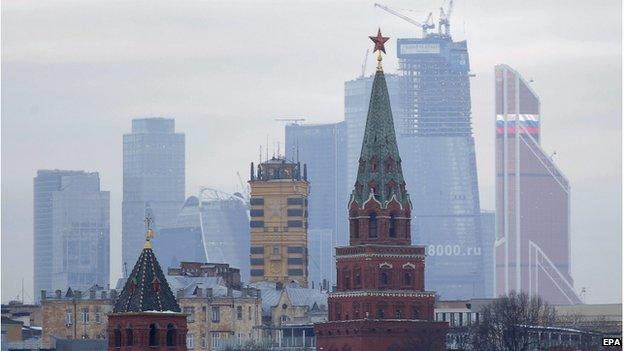Russia's fast track to ruin
- Published

Here are the numbers that explain why the Russian economy is imploding in the face of a tumbling oil price and Western sanctions.
Oil and gas energy represents two thirds of exports of around $530bn (£339bn). Without them, Russia would have a massive deficit on its trade and financial dealings with the rest of the world - which is why Russia's central bank expects a capital outflow of well over $100bn this year and next.
And public expenditure is almost completely supported by energy-related revenues. In their absence, the government would be increasing its indebtedness by more than 10% a year, according to IMF data.
So the massive and unsustainable non-oil deficits in the public sector and trade explain why investors don't want to touch the rouble with even the longest barge pole.
And Western sanctions, imposed to punish Putin for his Ukraine adventure, make it all the harder for Russia's undersized non-oil economy to trade the country out of its mess.
Desperate government?
Little wonder then that the rouble has halved this year, more-or-less in line with the tumbling oil price.
That raises the spectre of rampant inflation - prices are already rising more than 9% a year on the backward-looking official measure.
And there is the twin nightmare of a fully fledged slump: Russia's central bank expects the economy to contract not far off 5% next year.
But even so the decision of Russia's central bank to raise its policy interest rate from 10.5% to 17% is eye-catching (ahem).
It might work to stem the rouble's fall. Then again it could reinforce investors' fears that the government is increasingly desperate and powerless in the face of a market tsunami.
Global ripples
Russia isn't bust yet. In the middle of the year, it was projected by the IMF to hold reserves equivalent to about a year's worth of imports. That will probably be down to nearer 10 months now, but provides some kind of cushion.
What does it mean for the rest of us? Well it doesn't help that Russia is sucking demand from a global economy that is already looking a bit more ropey, as the eurozone stagnates and China slows.
As for the exposure of overseas banks - at $364bn, including guarantees - that is serious but not existentially threatening (and loans made by UK banks are just a few percentage points of that).
There are also about half a trillion dollars of Russian bonds trading, with about a third of those issued by the government. Most of those will be viewed by investors as junk, even if they are not officially classified as such by the rating agencies.
Or to pull it all together, Russia is massively leaking cash. And absent an entente with the West over Ukraine, which does not look imminent, it is challenging to see how the hole can be plugged.